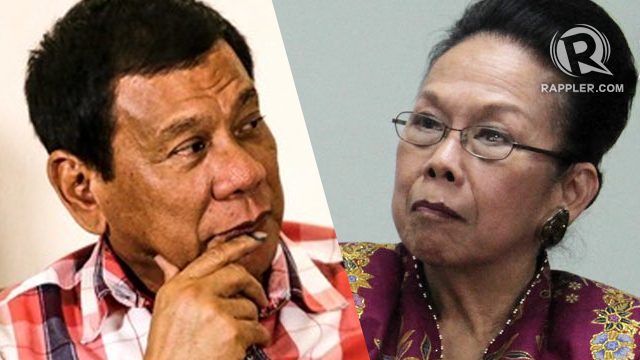SUMMARY
This is AI generated summarization, which may have errors. For context, always refer to the full article.

MANILA, Philippines – “I guess people who know the President-elect have said expect the unexpected, and we’re seeing that, which is partly exciting [and] partly scary.”
This is what Commission on Higher Education (CHED) Chairperson Patricia Licuanan said when asked what she expects under Rodrigo Duterte’s presidency.
“As a psychologist, I always say that people adjust to their roles. When he’s president, he will really have to act like a president and think things through a little bit more,” she added.
In the past weeks, Duterte appointed several people to his Cabinet. Licuanan, however, expects to stay since her term as CHED chairperson will not be over until 2018.
“I expect to [stay], but he’s unpredictable at the moment. But I do have a term. So my term is over in 2018. Even if he appoints [someone], I will inform him nicely [that I have a term], and then sana nga (I hope) if he needs me, he will see that he’ll be lucky to have me as [chair of CHED],” she told reporters in an ambush interview on Monday, June 6.
She’s not sure what to expect under a Duterte presidency, but her guess is that “we will continue all the main things we have been doing,” especially the commission’s focus on access, quality, capacity, and excellence.
Talking about the prospect of continuing scholarship programs for students in special circumstances, Licuanan said, “I think many of these things will fit the new president’s agenda because he talks about poverty a lot, and helping alleviate or lessen poverty.”
In 2015, President Benigno Aquino III signed the Unified Student Financial Assistance System for Tertiary Education. It seeks to rationalize all existing student financial assistance programs of the government to help more students stay in college.
On Monday, Licuanan also noted that Duterte’s support for federalism is very compatible with the commission’s efforts at strengthening regional institutions.
“We try to bring regional higher education institutions together so that they will work on a more coordinated manner, and then raise their quality. I think it dovetails very well with President Duterte’s ideas behind federalism, because, ostensibly, the reasons for that are so that you get out of imperial Manila and develop the regions. So I think that would be also very compatible with the President,” the CHED chairperson said.
Licuanan said Duterte is “very much anti-graft and corruption.” CHED, meanwhile, has efforts to reform governance in higher education “because…we want [state universities and colleges] to be run honestly.”
Since Duterte has decided to support K to 12, Licuanan thinks even the commission’s own preparations for the K to 12 transition period will be supported by the President-elect. – Rappler.com
Add a comment
How does this make you feel?
There are no comments yet. Add your comment to start the conversation.